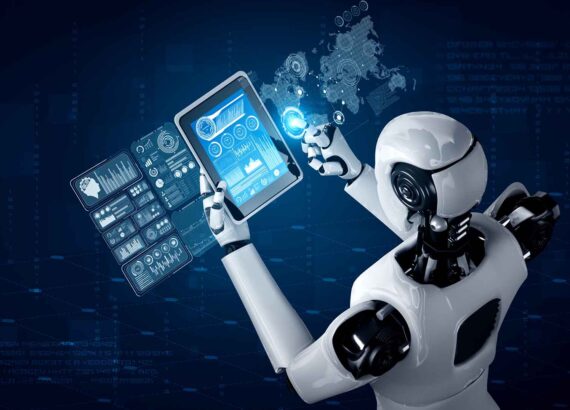The World is Being Revolutionized by These Top AI Technologies
Artificial Intelligence (AI) technologies have emerged as a powerful force reshaping various industries and transforming the way we live and work. From machine learning algorithms that empower smart systems to natural language processing capabilities that enhance human-machine interaction, AI is making a significant impact on our daily lives.
Computer vision and robotics are augmenting visual perception and redefining automation, while virtual assistants are revolutionizing both personal and professional spheres. Additionally, AI is revolutionizing healthcare by enabling advanced diagnosis and treatment, and it is enhancing decision-making processes in the finance sector. In this article, we explore the top 10 AI technologies that are changing the world, diving into their applications and understanding the immense potential they hold for the future.
Discover the top 10 AI technologies that are revolutionizing the world and shaping the future. From machine learning to natural language processing, explore how these advancements are transforming industries and impacting our daily lives. Stay ahead of the curve and learn about the cutting-edge AI technologies that are changing the game.
1. Introduction to AI Technologies: Revolutionizing the World
The Rise of Artificial Intelligence
It has become an integral part of our lives, transforming the way we work, communicate, and interact with the world around us. The rise of AI technologies has been nothing short of extraordinary, with advancements in machine learning, natural language processing, and computer vision pushing the boundaries of what is possible.
Understanding the Impact of AI Technologies
AI technologies have the potential to revolutionize industries and bring about tremendous changes. It is empowering smart systems, enhancing human-machine interaction, and augmenting visual perception. In this article, we will explore the top 10 AI technologies that are changing the world and understand their impact on our daily lives.
2. Machine Learning: Empowering Smart Systems
What is Machine Learning?
Machine Learning is a subset of AI that focuses on creating algorithms and models capable of learning and making predictions from data. It enables machines to automatically improve their performance without being explicitly programmed. Simply put, machines can learn from experience and make decisions based on patterns and insights derived from data.
Supervised Learning: Teaching Machines to Learn
It involves training a model using labelled data, where the machine learns to predict outcomes based on input features. This technique is widely used in areas such as image recognition, fraud detection, and language translation.
Unsupervised Learning: Discovering Patterns in Data
It aims to discover patterns and relationships within the data without any predefined outcomes. This approach is often used for customer segmentation, anomaly detection, and recommendation systems.
Reinforcement Learning: Machines That Learn from Experience
Reinforcement learning involves training machines to make optimal decisions through trial and error. The machine learns by receiving feedback based on its actions and adjusts its behaviour accordingly. This technique has been successfully applied in areas like game playing, robotics, and autonomous vehicles.
3. Natural Language Processing: Enhancing Human-Machine Interaction
The Evolution of Natural Language Processing
Over the years, NLP has evolved from simple speech recognition to more complex tasks like sentiment analysis and language translation.
Speech Recognition: Enabling Voice Commands
Speech recognition technology has made significant progress, allowing machines to understand and transcribe human speech accurately. It has revolutionized voice assistants like Siri and Alexa, enabling us to perform various tasks using voice commands effortlessly.
Language Translation: Breaking Down Communication Barriers
Language translation has become more accessible and efficient, thanks to AI. Machine translation algorithms can now translate text from one language to another with remarkable accuracy. This breakthrough has bridged language barriers, facilitating global communication and fostering cultural exchange.
Text Sentiment Analysis: Understanding Human Emotions
Text sentiment analysis uses NLP techniques to extract subjective information from text, such as emotions, opinions, and attitudes. It helps businesses gain insights into customer sentiment, social media monitoring, and brand reputation management. Now, machines can understand not just what we say but also how we feel.

4. Computer Vision: Augmenting Visual Perception
The Role of Computer Vision in AI
Computer Vision is an AI technology that focuses on enabling machines to interpret and understand visual information from images and videos. It involves tasks like image classification, object detection, and image segmentation, enhancing machines’ visual perception capabilities.
Image Classification: Identifying Objects and Patterns
Image classification algorithms can now identify objects and patterns within images with remarkable accuracy. This has led to breakthroughs in fields such as medical imaging, self-driving cars, and quality control in manufacturing. Machines can now “see” and interpret images like never before.
Object Detection: Locating and Recognizing Objects
Object detection algorithms go a step further by not only identifying objects but also locating them within an image. This technology has numerous applications, from surveillance systems and autonomous vehicles to augmented reality and facial recognition.
Image Segmentation: Understanding Image Composition
Image segmentation algorithms aim to understand the composition of an image by dividing it into meaningful segments or regions. This allows machines to identify different objects within an image and understand their relationships. Image segmentation has been instrumental in areas like medical imaging analysis and autonomous navigation.
With these revolutionary AI technologies, the world is experiencing a transformation like never before. From empowering smart systems to enhancing human-machine interaction and augmenting visual perception, AI is reshaping industries and opening up new possibilities. The future is undoubtedly exciting, as we continue to push the boundaries of what AI can achieve. Making and Fraud Detection
5. Robotics: Redefining Automation and Collaboration
The Integration of AI and Robotics
Robots are no longer just characters in science fiction movies; they are now a reality thanks to the integration of artificial intelligence (AI) technology. By combining AI algorithms with robotics, we have seen a major leap in automation and collaboration capabilities. From robotic arms working in manufacturing plants to drones delivering packages, AI-powered robots are changing the way we work and live.
Industrial Robotics: Enhancing Manufacturing Processes
One of the areas greatly impacted by AI and robotics is the manufacturing industry. Industrial robots equipped with AI algorithms are improving production efficiency and accuracy. These robots can perform repetitive tasks with precision and speed, freeing up human workers to focus on more complex and creative aspects of production. With industrial robotics, we can expect increased productivity and reduced errors in manufacturing processes.
Service Robotics: Improving Daily Life
AI-powered robots are not just limited to factories; they are also making their way into our daily lives. Service robots, such as robotic vacuum cleaners and home assistants, are revolutionizing household chores and improving convenience. These robots can clean our floors, assist with cooking, and even provide companionship for the elderly. With service robotics, our daily tasks become easier and more efficient.
Social Robotics: Humanizing Interactions
Social robots are taking AI and robotics to a whole new level by humanizing interactions. These robots are designed to engage with humans in a way that simulates natural human communication. They can understand emotions, provide companionship, and even assist with therapy sessions. Social robots have the potential to revolutionize various industries, from healthcare to customer service, by providing unique and personalized experiences.
6. Virtual Assistants: Transforming Personal and Professional Lives
The Emergence of Virtual Assistants
Virtual assistants have become an integral part of our lives, both personally and professionally. These AI-powered software applications help us manage tasks, answer questions, and provide personalized recommendations. The emergence of virtual assistants, such as Siri and Alexa, has transformed the way we interact with technology and access information.
Voice-Activated Assistants: From Siri to Alexa
Voice-activated virtual assistants have become increasingly popular due to their convenience and ease of use. Whether it’s asking Siri for the weather forecast or requesting Alexa to play your favourite song, these assistants have become our go-to companions for everyday tasks. With advancements in natural language processing and speech recognition, voice-activated assistants continue to improve in understanding and responding to our commands.
Virtual Assistants in the Workplace
Virtual assistants are not limited to our homes; they are also transforming the way we work. In the workplace, virtual assistants can help streamline administrative tasks, schedule meetings, and provide valuable insights. They can also assist in research and data analysis, saving time and increasing productivity. With virtual assistants by our side, we can focus on more strategic and meaningful work.
The Future of Virtual Assistants
As AI technology continues to advance, virtual assistants will become even more capable and personalized. We can expect virtual assistants to integrate with other smart devices seamlessly, providing a unified and interconnected experience. They may also become more proactive, anticipating our needs and providing proactive suggestions. The future of virtual assistants is promising, and they will play an increasingly vital role in our personal and professional lives.
7. Artificial intelligence in healthcare: revolutionizing diagnosis and treatment
The Advancements of AI in Healthcare
Artificial intelligence has made significant advancements in the field of healthcare, revolutionizing the way we diagnose and treat diseases. AI algorithms can analyze vast amounts of medical data, identify patterns, and provide accurate predictions. This technology has the potential to improve patient outcomes, reduce medical errors, and enhance overall efficiency in healthcare systems.
AI technology is making significant strides in the healthcare industry, particularly in the fields of diagnosis and treatment. With its ability to process vast amounts of information quickly and accurately, AI is revolutionizing the way healthcare professionals approach patient care.
This transformative technology has the potential to greatly improve diagnosis accuracy and treatment efficacy, ultimately leading to better patient outcomes. In the realm of diagnosis, AI can analyze medical data, including patient history, symptoms, and test results, to identify potential patterns and predict the likelihood of certain diseases or conditions. This allows doctors to make more informed decisions and provide timely and accurate diagnoses.
AI algorithms can also help identify rare or hard-to-detect conditions by scanning vast databases of medical information that may be beyond the reach of human capabilities. Additionally, AI-powered systems are augmenting treatment processes by providing real-time insights and personalized recommendations. Machine learning algorithms can analyze patient data and generate treatment plans tailored to individual needs.
This not only expedites the treatment process but also enhances its effectiveness by considering factors such as medical history, genetics, and lifestyle. Furthermore, AI is streamlining administrative tasks in healthcare facilities, freeing up valuable time for healthcare professionals to focus on patient care.
Chatbots and virtual assistants equipped with natural language processing capabilities can handle routine inquiries and scheduling, leaving doctors and nurses with more time to dedicate to direct patient interactions. However, despite the potential benefits of AI in healthcare, there are still challenges that need to be addressed.
One major concern is ensuring the privacy and security of patient data. Equally important is the need to establish trust and transparency in AI algorithms and systems to gain acceptance from both healthcare professionals and patients. Additionally, there is a need for ongoing research and development to improve AI algorithms and expand their applications in healthcare.
In conclusion, AI is revolutionizing the healthcare industry by improving diagnosis accuracy, enhancing treatment efficacy, and streamlining administrative processes. As technology continues to advance, AI has the potential to transform patient care and ultimately lead to better health outcomes for individuals around the world.
Medical Imaging: Enhancing Diagnostics
Medical imaging, such as X-rays and MRIs, is an area greatly impacted by AI technology. This improves the accuracy and speed of diagnosis, leading to early detection of diseases and better treatment outcomes. AI-powered medical imaging has the potential to save lives and improve healthcare delivery.
Predictive Analytics: Improving Patient Outcomes
Predictive analytics, powered by AI, is changing the way we approach patient care. By analyzing patient data and medical records, AI algorithms can identify trends and predict potential health issues. This allows healthcare providers to intervene early, prevent complications, and improve patient outcomes. Predictive analytics has the potential to transform healthcare by shifting from reactive to proactive care.
Drug Discovery and Personalized Medicine
AI is also revolutionizing drug discovery and personalized medicine. AI algorithms can analyze vast amounts of genomic data, identifying potential drug targets and predicting treatment responses. With AI’s assistance, we can expect more effective and precise treatments tailored to individual patients.
8. AI in Finance: Enhancing Decision-Making and Fraud Detection
Artificial intelligence is transforming the financial sector in various ways, from improving decision-making processes to detecting financial fraud. AI algorithms can analyze massive amounts of financial data, identify patterns, and make data-driven predictions.
Algorithmic trading, powered by AI, has revolutionized the world of finance. AI algorithms can analyze market data in real time, identify trends, and execute trades automatically. This technology allows for faster and smarter investment decisions, reducing human errors and maximizing returns. Algorithmic trading has become a vital tool for financial institutions and individual investors alike.
Fraud Detection: Uncovering Financial Crimes
AI technology is also invaluable in detecting and preventing financial fraud. AI algorithms can analyze vast amounts of financial transactions, identify suspicious patterns, and flag potential fraudulent activities. This helps financial institutions protect themselves and their customers from fraudulent activities, safeguarding the integrity of the financial system.
AI-Powered Chatbots: Enhancing Customer Service in Banking
AI-powered chatbots are transforming customer service in the banking industry. These chatbots can assist customers with account inquiries, provide personalized recommendations, and even help with financial planning. With AI-powered chatbots, customers can have their queries answered quickly and efficiently, enhancing the overall customer experience in the banking sector.
Conclusion
In conclusion, the top 10 AI technologies discussed in this article are revolutionizing the world in remarkable ways. From machine learning to natural language processing, computer vision to robotics, and virtual assistants to AI in healthcare and finance, these technologies are transforming industries, improving efficiency, and enhancing our overall quality of life. As AI continues to advance and evolve, we can expect even more groundbreaking innovations that will shape the future. Individuals and businesses alike must stay informed and embrace the potential of AI, as it becomes increasingly integrated into our daily lives. The possibilities are endless, and the impact of AI technologies is truly changing the world.
FAQ
1. What are AI technologies?
AI technologies refer to a range of advanced tools and systems that leverage artificial intelligence to perform tasks that typically require human intelligence.
2. How are AI technologies changing the world?
AI technologies are changing the world by revolutionizing various industries and sectors. They are enabling automation, enhancing decision-making processes, improving efficiency, and transforming the way we interact with technology. From healthcare to finance and beyond, AI technologies have the potential to greatly impact our daily lives.
3. What are some real-world applications of AI technologies?
AI technologies are being applied in diverse fields. For instance, in healthcare, AI is being used for medical imaging analysis, predictive analytics, and drug discovery. In finance, AI is being utilized for risk assessment, fraud detection, and algorithmic trading. Additionally, AI is being integrated into virtual assistants, self-driving cars, smart homes, and more.
4. What does the future hold for AI technologies?
The future of AI technologies is incredibly promising. As AI continues to advance, we can expect even more innovative applications and advancements. This may include further advancements in machine learning algorithms, enhanced human-machine interaction, more sophisticated robotics, and breakthroughs in areas like personalized medicine and autonomous systems.
Thank you for reading 🙂
Get up to 70% Discount on Amazon Electronic Products
If you want to build your website at an affordable price contact: www.nextr.in
Read this: Top 8 Apps Every Entrepreneur Needs


















